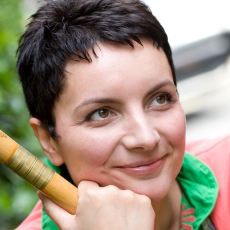Garden of Early Delights - Pamela Thorby & Andrew Lawrence-King - The Consort
The title of this recording plays upon an allusion, on the one hand making reference to Hieronymus Bosch's triptych The Garden of Earthly Delights and, on the other, alluding to the largest body of music composed for recorder, Jacob Van Eyck's The Flute's Garden of Delights. In doing so it promises much to the listener: variety, excitement and abundance. This promise is fulfilled and exceeded through a programme of music from the renaissance and early baroque periods, including works by Ortiz, Van Eyck, Castello, Dowland, Schop, Bassano, Fontana and Marini.
The quality of this disc, however, lies in more than the diversity of pieces presented. It is the spirit with which the music is performed that makes the recording truly distinguished. Pamela Thorby is an excellent recorder player and, in this instance, she accomplishes a fine balance between simplicity and virtuosity: ornamentation refines and enlivens the melodic line rather than obscuring it. Andrew Lawrence-King displays the sensitivity of his playing in solo items as well as providing a responsive partner for Thorby: the communication between the two seems intimate.
The most exciting thing about this disc is the enterprise that is embodies. This project recognises that the notion of authenticity is a construct both within period compositions, which continually responded to tradition (often in ways that traversed existing norms), and also within contemporary performance of early music, which is inevitably shaped by the modern era. Thus, the liner notes state that the recording does not serve as a ‘dry historical document' but seeks to reflect an ‘ever evolving tradition of musicians discovering and bringing to life a repertoire full of surprise, beauty and delight'.
Hence, some of the Van Eyck pieces incorporate continuo. In Wat zal men opden Avond doen and Boffons, the recorder sits buoyant upon the harp and psaltery, respectively, generating the contrast for the yearning sentiment of Derde, Doen Daphne d'over, which stands unaccompanied. Moreover, at the end of the Ortiz REcercada segunda that launches the album, Thorby embarks upon her own melodically and rhythmically modern musings upon the ground bass. Another highlight of the recording is the collection of three pieces that are suggestive of Dowland's Flow my tears motif: Schop's Lachrimae Pavaen, played on recorded and harp, is framed by solo harp performing Dowland's Sorrow, sorrow stay and weep you no more; the last of these is especially moving. I highly commend this recording.

